SSHRC Eligible and Ineligible Expenses
advertisement
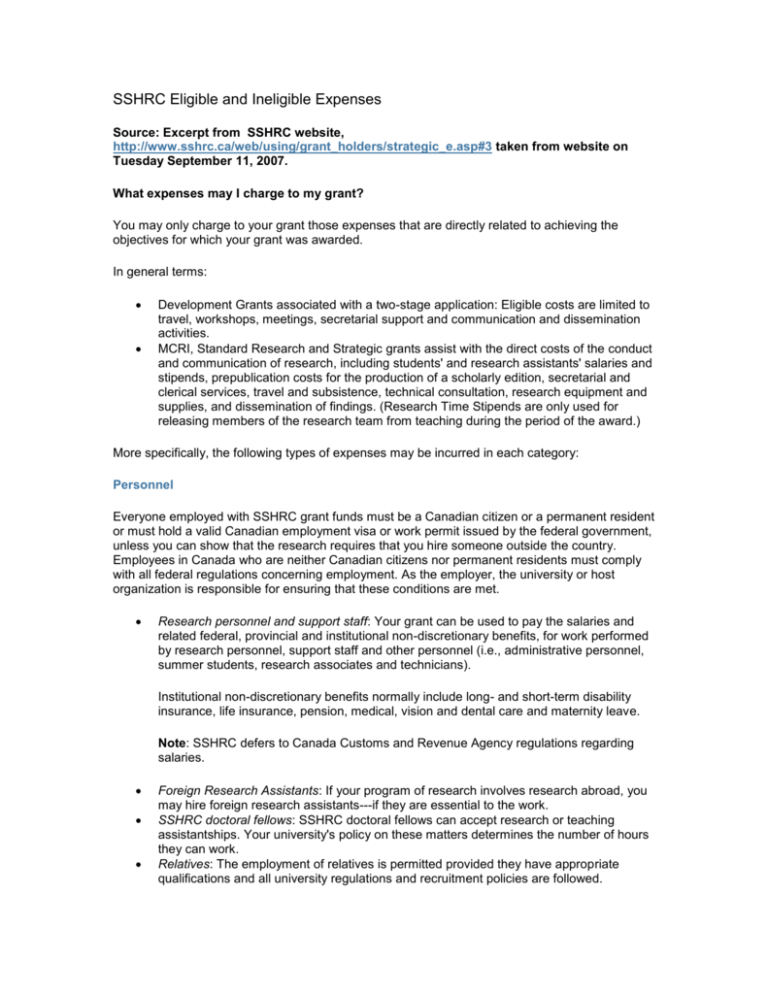
SSHRC Eligible and Ineligible Expenses Source: Excerpt from SSHRC website, http://www.sshrc.ca/web/using/grant_holders/strategic_e.asp#3 taken from website on Tuesday September 11, 2007. What expenses may I charge to my grant? You may only charge to your grant those expenses that are directly related to achieving the objectives for which your grant was awarded. In general terms: Development Grants associated with a two-stage application: Eligible costs are limited to travel, workshops, meetings, secretarial support and communication and dissemination activities. MCRI, Standard Research and Strategic grants assist with the direct costs of the conduct and communication of research, including students' and research assistants' salaries and stipends, prepublication costs for the production of a scholarly edition, secretarial and clerical services, travel and subsistence, technical consultation, research equipment and supplies, and dissemination of findings. (Research Time Stipends are only used for releasing members of the research team from teaching during the period of the award.) More specifically, the following types of expenses may be incurred in each category: Personnel Everyone employed with SSHRC grant funds must be a Canadian citizen or a permanent resident or must hold a valid Canadian employment visa or work permit issued by the federal government, unless you can show that the research requires that you hire someone outside the country. Employees in Canada who are neither Canadian citizens nor permanent residents must comply with all federal regulations concerning employment. As the employer, the university or host organization is responsible for ensuring that these conditions are met. Research personnel and support staff: Your grant can be used to pay the salaries and related federal, provincial and institutional non-discretionary benefits, for work performed by research personnel, support staff and other personnel (i.e., administrative personnel, summer students, research associates and technicians). Institutional non-discretionary benefits normally include long- and short-term disability insurance, life insurance, pension, medical, vision and dental care and maternity leave. Note: SSHRC defers to Canada Customs and Revenue Agency regulations regarding salaries. Foreign Research Assistants: If your program of research involves research abroad, you may hire foreign research assistants---if they are essential to the work. SSHRC doctoral fellows: SSHRC doctoral fellows can accept research or teaching assistantships. Your university's policy on these matters determines the number of hours they can work. Relatives: The employment of relatives is permitted provided they have appropriate qualifications and all university regulations and recruitment policies are followed. Research Time Stipends: In cases where a research time stipend (RTS) has been approved, the Council's portion of the stipend is included in the grant. If both the university and SSHRC portions of the stipend are used to release members of the research team from teaching during the period of the grant, these funds do not have to be assigned as indicated in the original application. Research Time Stipends may be used to pay for the actual teaching replacement costs of either the applicant or any coapplicant listed in the application. Student Stipends: Students may not receive stipends while holding a SSHRC doctoral or postdoctoral fellowship. However, SSHRC fellowship and stipend recipients may concurrently hold teaching assistantships or research assistantships from other sources. The award of a student stipend should be made in accordance with the objectives of the research project or program and the work performed by students who receive stipends should be an integral part of the grantee's program of research. Master's students are eligible for stipends up to $12,000 per year, doctoral students may receive up to $15,000 per year, and postdoctoral fellows may receive up to $31,500 per year. Recruiting costs for research personnel such as advertising and airfare for candidates, etc. Fees paid to research subjects (such as modest incentives for participation), where ethically acceptable. Professional and technical services and contracts Computer Services: All computer services for which researchers must pay a user fee are eligible expenses. University computer services are expected to offer grant holders mostfavoured-user rates. Consultants: Grant recipients are expected to have the full qualifications and experience necessary to carry out research programs/projects for which they are funded, or to obtain the help of fellow scholars as part of reciprocal scholarly collaboration. Consulting fees may be charged against the grant only if the application proposal demonstrates that expert advice is needed to resolve highly technical problems. Safety waste disposal. Cost of subcontracts. Costs involved in providing personnel with training and/or development in novel techniques required for the conduct of the research project. Communication of results (eligible expenses include): Circulation of findings through traditional media, as well as on video, CD-ROM, etc.; Travel to scholarly meetings; Translation; Holding a workshop whose activities relate directly to the research funded. (The cost of meals for workshop participants may be charged to the grant, but alcoholic beverages may not.); Preparing a manuscript for publication (e.g., layout and preparation and/or purchase of illustrations, figures, maps, drawings and photographs); For research activities leading to the publication of a scholarly edition: travel and subsistence of the editorial board; Preparation of primary data to make them accessible to other researchers; Costs of sending copies of data, reports or publications to the community where the research was conducted (in Canada or abroad); Development of Web-based information, including Web maintenance fees. Equipment and supplies All items purchased with SSHRC funds are the property of the university or organization administering the award. Any non-disposable items (including books, research materials and documents) must be formally listed in the university's or organization's inventory. Computer hardware and software: You may purchase or rent computers and associated hardware and software, if you do not have access to such items through the institution. Other non-disposable equipment: You may purchase or rent equipment, such as microfilm readers, tape recorders, cameras, video equipment, field vehicles, laboratory accessories and equipment, if you do not have access to such items through the institution. Other supplies: You may claim the following items only if they are directly related to the research: disposable supplies (such as stationery), postage, telephone calls, cards, tapes, books, documentation, microfilm and duplicated material. Safety related expenses for field work, such as protective gear, immunizations, etc. Monthly charges for the use of the Internet from your office or home. Equipment and supplies (during sabbatical and leave periods) The cost of renting a vehicle necessary for fieldwork (with prior institutional approval; and the vehicle must be licensed and insured during the sabbatical period). The cost of transporting research equipment to and from your sabbatical location. Travel and related subsistence costs You may claim travel and related subsistence costs, only if data or sources of information essential to the research activities are not available in your immediate vicinity or if you have to travel to communicate your research results. You may charge the travel and subsistence costs of research collaborators, both Canadian and foreign, only if the visit is for research planning, exchange of information or for the communication of research results. Travel and subsistence costs for research and student assistants can be charged to the grant if the visit is essential to the research. Travel costs must be based on standard rates or policies in effect at your institution. If no guidelines for travel per diems exist at your institution, the federal government Treasury Board guidelines apply. These are available from SSHRC. Travel: You may claim the cost of air travel, provided that you obtain the lowest fare possible and that the cost does not exceed the equivalent of full economy fare. Subsistence costs may be claimed for the additional days a traveler may be required to stay in order to take advantage of a lower fare, provided that the total cost of the fare and subsistence is less than the cost of a full economy fare. If an upgrade is necessary for medical or other reasons, you must seek reimbursement elsewhere (i.e., your health insurance plan). Rental or mileage costs are allowed only if the use of a car is essential. Normal commuting costs may not be paid from a SSHRC grant account. Subsistence: These costs must be justified by research needs and may be applied only to time spent away from your home. You may claim subsistence only when overnight accommodation is required. Subsistence costs may not be claimed for more than 125 days per person per year. Other types of eligible travel expenditures A member of the research team who is a nursing mother or single custodial parent can claim child care or babysitting expenses while travelling. The allowable cost for a single parent is limited to overnight child care costs incurred while travelling. During sabbatical and leave periods: Travel costs to attend a conference during a sabbatical leave. Networking activities In the case of Strategic Grants and Joint Initiatives, costs related to networking activities may be charged to the grant. These costs may include travel and subsistence, purchase of a fax or other telecommunication tools, hiring of network coordinators, food and drink (excluding alcoholic beverages) for research meetings or workshops, etc. Will I have to provide receipts for all my eligible expenses? You are required to provide supporting documentation for all eligible expenses including internal expense allocations and shared expenses. This documentation must include original receipts or invoices and a statement justifying the expenses in the context of the program of research. The documentation you submit must be in compliance with university guidelines. For internal or shared expenses your documentation must include the amount charged to your SSHRC account, a description of how the amount was calculated and what the charge was for. Travel claims Every traveler claiming expenses from a SSHRC grant must prepare an individual claim for each trip. For claimants other than the grant holder, the affiliation with the grant holder's research group must be specified. Travel claims must be countersigned by the department head or dean as to the relevance of the travel to the funded research. In most universities, the business office or the human resources office is responsible for collecting and storing documentation related to eligible expenses. Your travel claim must include the following information: Purpose of the trip; Dates and destinations (persons or organizations visited); Official documentation indicating the dates of conferences and workshops; Details of daily claims for expenditures relating to those visits; Details of any vehicle used; Original receipts, such as hotel bills, car rental agreements, etc. (invoices and credit card slips are not valid receipts); The claimant's signature certifying that all expenditures on the claim are for purposes for which the grant was awarded, that the charges included have not been claimed from other organizations, and that reimbursements for expenditures received from other organizations will be disclosed to the university. Air travel ticket receipts Original air travel ticket receipts must be returned with the grant holder's travel claim. Boarding passes will not be accepted in lieu of ticket receipts, except in the case of electronic tickets. Personnel: compensation and benefits You must be able to provide signed employment records, which include the employee's name, category, salary level, period of employment and details of any employee benefits paid from the grant. Equipment You must be able to supply original invoices describing what you purchased and the price you paid for it. Who owns equipment purchased with SSHRC grant funds? Equipment purchased with SSHRC grant funds is your property during the period of your grant. Once the grant period is finished, however, the equipment becomes the property of your university or organization. If you change universities or organizations and you transfer your grant to your new university or organization, the equipment you purchased in order to carry out your research remains your property until the period of the grant is over. After that, the equipment belongs to your new university or organization. What costs are ineligible? Any activity that is not required to achieve the research objectives of the program or project is ineligible. For example, the following expenses are ineligible: 1. 2. 3. 4. 5. 6. 7. 8. Research by the applicant or co-applicant leading to a degree. Education-related costs, such as thesis defence, publication, tuition and course fees, etc. Research costs of Strategic Grant partners. Research costs of research collaborators. (Note: some travel costs may be eligible as explained under Travel and related subsistence costs.) Any research expenses related to work being carried out by the researcher under contract to a public or private agency or firm for their own purposes, with the exception of work commissioned by a non-government publisher. Activities that have no significant research component (e.g., conducting a public opinion poll which does not include analysis likely to produce new knowledge, reviewing literature, preparing research proposals, summarizing the findings of other researchers, etc.). This does not apply to development grants awarded to applicants successful at the Letter of Intent stage in such programs as CURA. Fees for consultation with colleagues or for their participation in the research. Contingency allowances. 9. Indirect costs (e.g., medical insurance) or administrative overhead. 10. Purchase or rental of standard office equipment such as desks, chairs, filing cabinets, photocopiers, facsimile machines and answering machines. (Note: some equipment costs may be explained under Networking activities. 11. Sales taxes to which an exemption or rebate applies. 12. Child-care expenses. See Other types of eligible travel expenditures for exceptions. 13. The cost of memberships in professional associations. 14. Professional training or development, including computer and language training. 15. Preparation of teaching materials. 16. Curriculum development (e.g., preparing course material or syllabus designed for a program of teaching—unless it is of demonstrated theoretical importance or part of a research program or project). 17. Simple collection or assembling of information (rather than analysis designed to answer a research question or test an hypothesis). 18. Entertainment costs. 19. Hospitality costs. 20. The purchase of land. 21. Discretionary severance and separation packages. 22. General departmental expenses. Although researchers may use grant funds to share common research expenses, the cost of the shared expenses must be pro-rated on the basis of benefit obtained. The grant funds may not be used to contribute to shared expenses for which the researcher will obtain no benefit. 23. Administrative (or management) charges and fees. 24. Passports and immigration fees. 25. Standard monthly connection or rental costs of telephones. 26. Connection or installation of lines (telephones or other links). 27. Voice mail, cellular phone rental or purchase. 28. Library acquisitions, computer and other information services provided to all members of a institution. 29. Any part of the salary, or consulting fee, of an individual whose status would make them eligible to apply for a grant. 30. During sabbatical and leave periods: Transportation costs of research personnel to and from your sabbatical or leave location for supervisory or academic purposes. Transportation costs to the home institution for supervisory purposes during sabbatical leave. Living expenses during sabbatical leave. Note: This list is not exhaustive. If you are in doubt about the eligibility of a particular expense, contact your research grant officer or your university business office for clarification. If the university is not sure about the eligibility of an expense, your research grant officer will contact SSHRC for further clarification.
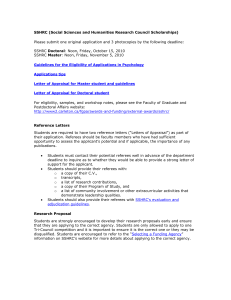


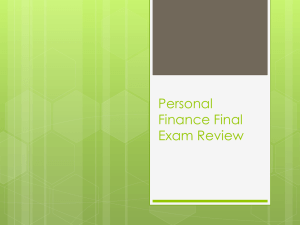
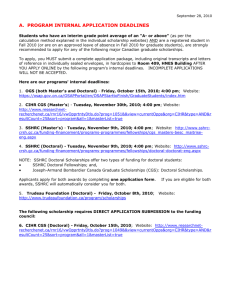
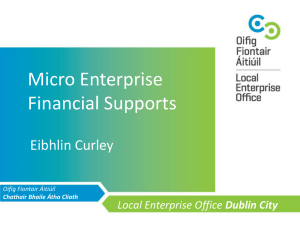
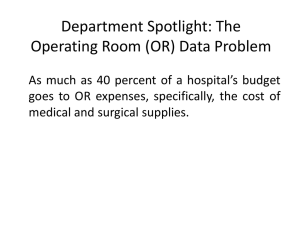
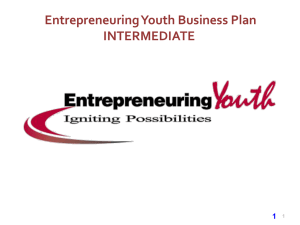

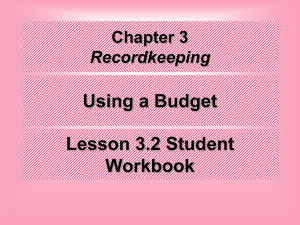
![RSO Tip Sheet [3]](http://s3.studylib.net/store/data/006821365_1-896174b2291ed80f4b27ff1aee2b5c7d-300x300.png)